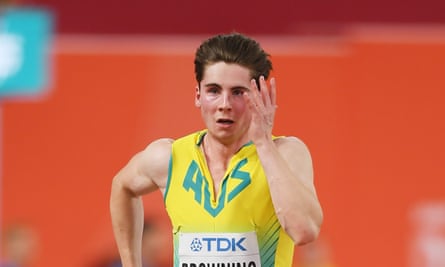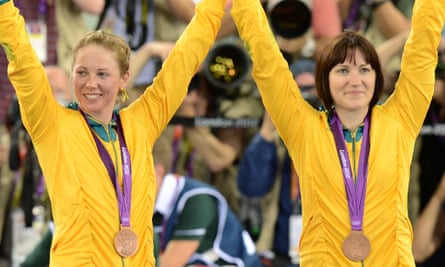A common theme emerges from any conversation with Australia’s Olympic athletes: in their minds, the Tokyo 2021 Games are going ahead. Whether they will actually take place this July remains uncertain; on Friday, the Japanese government was forced to deny reports they would be cancelled. But for Australia’s Olympians, doubt is not conducive to peak performance.
“Honestly, I don’t even think about it,” says Ariarne Titmus, a Tasmanian swimmer who won two gold medals at the most recent world championships and is tipped for big things in Tokyo. “I go into training every day thinking that the Olympics will happen. It never even crosses my mind that they won’t. That is the mindset I need to get the best out of myself.”
Speaking to Guardian Australia from a training camp in Mackay, Titmus says the alternative is unthinkable. “There is no point wondering if it is going to happen, not completely devoting yourself to training, and then it turns out that the Olympics are on and you haven’t prepared as best you can,” says the swimmer, who announced herself on the world stage in 2019 by beating American sensation Katie Ledecky in the 400m freestyle. “I am not looking at the media, I’m just preparing as if the Olympics will go ahead.”
Rohan Browning, a 100m sprinter who this month became only the second Australian to crack the 10sec barrier, has adopted a similar mindset. “My approach has been pretty cut and dry,” Browning says. “I have no control over the decision of whether the Olympics goes ahead, so I am not going to lose sleep over it. The uncertainty is just part of life’s divine comedy; at least it keeps it interesting.”
Titmus, 20, and Browning, 23, have time on their side. “I am lucky that I am young,” says Titmus. “If [Tokyo 2021] is cancelled, I know that I have a few more years to keep racing, and hopefully make it to the next Olympics.” But for Kaarle McCulloch, a 33-year-old track cyclist who won bronze at the 2012 London Olympics, a further postponement or outright cancellation could dash her dreams of a fairytale Olympic farewell.

“My main focus is just to get back on my bike,” says McCulloch, who is in the final stretch of rehabilitation from injury. “I am keeping my goals very short term. The Olympics may only be 180 or so days away, but I am not thinking too far ahead. One of the mottos our sprint group has taken on is that we have to learn to live with Covid-19. I really hope the Olympics will go on – to show that it is possible for us to do that.”
The postponement of the 2020 Games has already proven to be a major blow for McCulloch, whose team sprint colleague, Stephanie Morton, decided to retire in November. The duo won gold in the discipline at the 2019 world championships and silver in 2020. Morton and McCulloch were favourites to win team sprint gold in Tokyo. Now McCulloch must focus on the individual sprint and the keirin, where her medal prospects are less certain.
“I was pretty disappointed, to be quite honest,” McCulloch says of Morton’s retirement. “I really do believe we had a good shot. But I don’t begrudge Steph her decision; all of the reasons why she retired are things that still go through my head. Will the Games go ahead? Will it be safe? At the end of the day, it is just another bike race – why am I still pursuing it? What I came back to was that every day I still wake up wanting to ride my bike. I believe I have more to give.”
While 2020 was a difficult year for many Australian athletes, Browning says the time off from racing has been a blessing in disguise. “It has been a tumultuous time,” he concedes. “But the silver lining for me was that there was no pressure to compete and I was able just to train all through the year. I think that really allowed me to go to another level in terms of performance.”

For Titmus, meanwhile, Australia’s first lockdown kept her on dry land for a month. “It was the longest break I’ve ever had in my career,” she says. “At the start I did not really know what to do with myself – suddenly I could sleep in! But very quickly I was over it and keen to get back in the pool.” Based in Queensland, the swimmer is grateful that her training regimen has been uninterrupted ever since. “As soon as I was back in the pool, I felt like I got back into my groove,” she adds.
With less than six months to go before Tokyo 2021, but with the spectre of a Covid-19-induced cancellation ever present, Australia’s Olympians are doing their best to stay upbeat. “There is always something else on the horizon,” Titmus says. “Next year we have the Commonwealth Games in Birmingham and then the world championships. It would be a disappointing if [Tokyo 2021] doesn’t happen, but there is always 2024. Onwards and upwards – that’s just the way you have to look at it.”
Browning is philosophical. “If the Olympics were cancelled, there is no doubt that would be incredibly disappointing,” he says. “But the reality is I would get over it. I wouldn’t want any sympathy, any pity. This is sport: triumph and disaster, you can’t have one without another.” The sprinter has spent time volunteering for the Steve Waugh Foundation, which works to support children and families affected by rare diseases. “That gave me real perspective,” he says. “After that I decided I didn’t want to whinge about anything ever again. I have a lot to be grateful for, with or without the Olympics.”

Comments (…)
Sign in or create your Guardian account to join the discussion